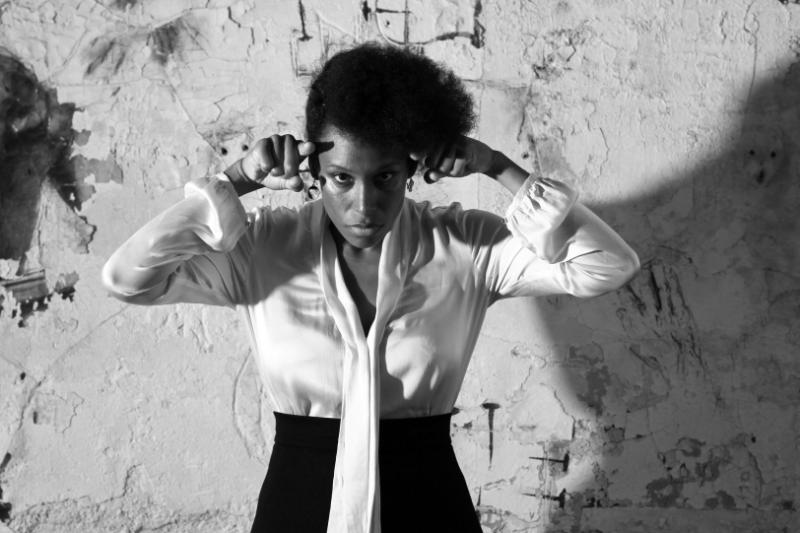Sandra Nkaké and Jî Drû, Pizza Express Jazz Club - "mesmerising, leonine" | reviews, news & interviews
Sandra Nkaké and Jî Drû, Pizza Express Jazz Club - "mesmerising, leonine"
Sandra Nkaké and Jî Drû, Pizza Express Jazz Club - "mesmerising, leonine"
French-Cameroonian singer lands on the London scene with delirious spectacle

A first live experience of the French-Cameroonian singer Sandra Nkaké leaves many questions unanswered. Once the immediate bewilderment has passed, the most pressing question for a British audience should be: why is this extraordinary performer not block-booking the festival circuit?
There’s a touch of Grace Jones about Nkaké’s stage presence, and the steely penetration of her gaze hinted at Jones’ role as May Day in the mediocre Bond film A View to a Kill. As soon as she began to sing, however, it became clear that artistry on another plane entirely was taking place. Her tawny mohican already had a touch of mane about it, but her velvety, muscular purr, ominous when scarcely audible, spine-shredding at full power, clinched the feline atmosphere. Potent, sensual, suggestive, it’s an instrument of exquisite power, which was here set off to perfection by the musical arrangements.
Though she sometimes travels with a full band, this show, with Drû’s flute and keyboard-sampler and Nkaké adding occasional shakers, was perfectly judged for the occasion. The flute’s breathy tone matches that of Nkaké’s voice, while its register, generally higher than the singer’s, hints at a gender role-reversal. Drû’s sampler generally built up layers of both voice and flute, which span deliriously beneath the live sounds. It was by turns eerie, evoking a futuristic, even apocalyptic emptiness; but also organic, suggesting a thrusting, erotic pulse.
Her repertoire was, in name, quite conventional, though the identity of some songs took careful listening to establish. The Doors’ “Light My Fire” was the easiest to identify, its refrain circling hypnotically over the whirling sampler like a narcotic cloud. It wasn’t particularly subtle, and the gleeful demeanour of the performers suggested they knew as much, too, but it was irresistibly enjoyable. Nina Simone’s “Four Women” and Terry Callier’s “Dancing Girl” were both darker and more reflective, Drû’s rapid-tonguing rhythm and Nkaké’s skeletal, rattling shakers portraying a panicky, vulnerable mood. Françoise Hardy’s “Mon Amie La Rose”, their final song, was stylishly done as an acoustic duo, though as singers they suddenly felt naked, and almost a little bit ordinary, without their entrancing web of sampled spectacle.
 Nkaké is billed as a combination of soul, jazz and pop, and for once, this breadth of categorisation was not merely a publicist’s vagueness. There’s undoubtedly the emotional authenticity of soul, the inventiveness of jazz, and the sheen and spectacle of pop, but the three worked together to spellbinding effect. It wasn’t just a musical triumph, however: Nkaké trained as an actress and spoke of the preparation of this “show” as a multi-dimensional performance. Theatricality and an engagingly self-aware humour contributed to a triumphant set that must, for British audiences, be one of the discoveries of the season. She’d go down a storm at Ronnie Scott's.
Nkaké is billed as a combination of soul, jazz and pop, and for once, this breadth of categorisation was not merely a publicist’s vagueness. There’s undoubtedly the emotional authenticity of soul, the inventiveness of jazz, and the sheen and spectacle of pop, but the three worked together to spellbinding effect. It wasn’t just a musical triumph, however: Nkaké trained as an actress and spoke of the preparation of this “show” as a multi-dimensional performance. Theatricality and an engagingly self-aware humour contributed to a triumphant set that must, for British audiences, be one of the discoveries of the season. She’d go down a storm at Ronnie Scott's.
Neither chalk nor cheese has any place in a performance of this standard, but they did suggest themselves when Georgia Mancio (pictured above left), singing a first set with pianist Tom Cawley, gave a debut of her and Cawley’s original work, which in its naturalism, psychological subtlety and domestic focus, was everything Nkaké’s wasn’t. There were a couple of perfectly-pitched covers, but perhaps of most interest were Mancio’s own lyrics, which, very unusually for jazz songs, take an interest in everyday life. This was summed up by the song “Gerry the Iceskater”, about an elderly neighbour and former professional skater now suffering incipient dementia. Mancio, whose control of phrasing has a precision few can match, explored this scenario with both drama and tenderness. Cawley is an expansive accompanist, offering plenty of colour and atmosphere, and this is clearly the beginning of a very productive partnership. From the giddiest spectacle to the most intimate human concern, this was a gig with everything to offer. A triumph of both programming and performance.
The future of Arts Journalism
You can stop theartsdesk.com closing!
We urgently need financing to survive. Our fundraising drive has thus far raised £49,000 but we need to reach £100,000 or we will be forced to close. Please contribute here: https://gofund.me/c3f6033d
And if you can forward this information to anyone who might assist, we’d be grateful.

Subscribe to theartsdesk.com
Thank you for continuing to read our work on theartsdesk.com. For unlimited access to every article in its entirety, including our archive of more than 15,000 pieces, we're asking for £5 per month or £40 per year. We feel it's a very good deal, and hope you do too.
To take a subscription now simply click here.
And if you're looking for that extra gift for a friend or family member, why not treat them to a theartsdesk.com gift subscription?
more New music
 Lily Allen's 'West End Girl' offers a bloody, broken view into the wreckage of her marriage
Singer's return after seven years away from music is autofiction in the brutally raw
Lily Allen's 'West End Girl' offers a bloody, broken view into the wreckage of her marriage
Singer's return after seven years away from music is autofiction in the brutally raw
 Music Reissues Weekly: Joe Meek - A Curious Mind
How the maverick Sixties producer’s preoccupations influenced his creations
Music Reissues Weekly: Joe Meek - A Curious Mind
How the maverick Sixties producer’s preoccupations influenced his creations
 Pop Will Eat Itself, O2 Institute, Birmingham review - Poppies are back on patrol
PWEI hit home turf and blow the place up
Pop Will Eat Itself, O2 Institute, Birmingham review - Poppies are back on patrol
PWEI hit home turf and blow the place up
 'Fevereaten' sees gothic punk-metallers Witch Fever revel in atmospheric paganist raging
Second album from heavy-riffing quartet expands sonically on their debut
'Fevereaten' sees gothic punk-metallers Witch Fever revel in atmospheric paganist raging
Second album from heavy-riffing quartet expands sonically on their debut
 theartsdesk Q&A: Soft Cell
Upon the untimely passing of Dave Ball we revisit our September 2018 Soft Cell interview
theartsdesk Q&A: Soft Cell
Upon the untimely passing of Dave Ball we revisit our September 2018 Soft Cell interview
 Demi Lovato's ninth album, 'It's Not That Deep', goes for a frolic on the dancefloor
US pop icon's latest is full of unpretentious pop-club bangers
Demi Lovato's ninth album, 'It's Not That Deep', goes for a frolic on the dancefloor
US pop icon's latest is full of unpretentious pop-club bangers
 Yazmin Lacey confirms her place in a vital soul movement with 'Teal Dreams'
Intimacy and rich poetry on UK soul star's second LP
Yazmin Lacey confirms her place in a vital soul movement with 'Teal Dreams'
Intimacy and rich poetry on UK soul star's second LP
 Solar Eyes, Hare & Hounds, Birmingham review - local lads lay down some new tunes for a home crowd
Psychedelic indie dance music marinated in swirling dry ice
Solar Eyes, Hare & Hounds, Birmingham review - local lads lay down some new tunes for a home crowd
Psychedelic indie dance music marinated in swirling dry ice
 The Lemonheads' 'Love Chant' is a fine return to form
Evan Dando finally gets back in the saddle with an album of new tunes
The Lemonheads' 'Love Chant' is a fine return to form
Evan Dando finally gets back in the saddle with an album of new tunes
 Music Reissues Weekly: Evie Sands - I Can’t Let Go
Diligent, treasure-packed tribute to one of Sixties’ America’s great vocal stylists
Music Reissues Weekly: Evie Sands - I Can’t Let Go
Diligent, treasure-packed tribute to one of Sixties’ America’s great vocal stylists
 'Deadbeat': Tame Impala's downbeat rave-inspired latest
Fifth album from Australian project grooves but falls flat
'Deadbeat': Tame Impala's downbeat rave-inspired latest
Fifth album from Australian project grooves but falls flat
 Heartbreak and soaring beauty on Chrissie Hynde & Pals' Duets Special
The great Pretender at her most romantic and on the form of her life
Heartbreak and soaring beauty on Chrissie Hynde & Pals' Duets Special
The great Pretender at her most romantic and on the form of her life

Add comment